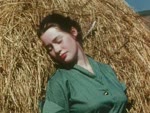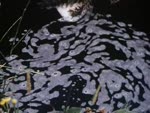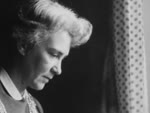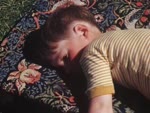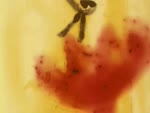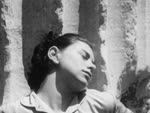PORTRAIT OF GA, a
Full length video
Please read Understanding catalogue records for help interpreting this information and Using footage for more information about accessing this film.
Title: PORTRAIT OF GA, a
Reference number: 3698
Date: 1952
Director: filmed by Margaret Tait
Production company: Ancona Films
Sound: sound
Original format: 16mm
Colour: col
Fiction: fiction
Running time: 4.27 mins
Description:
The 'Ga' of the title refers to the film maker's mother. The film gathers together this elderly lady's everyday actions to offer an abstract insight into her life.
Margaret Tait described this film as follows: 'My mother seemed a good subject for a portrait, (she was there), and I thought it offered a chance to do a sort of 'abstract film', in the sense that it didn't have what you might call 'the grammar of film'. It's mostly discontinuous shots linked just by subject, in one case by colour, only rarely by movement'.
See also Additional Information file at 11/1/455. Paper Archives 4/5/119, 4/11/651, 4/5/92.
The Tait papers are deposited in Orkney Archives. Currently being catalogued. For any enquiries please contact Principal Archivist.
Online tour of this title, interpreted by contemporary Scottish writer Ali Smith can be found on the LUX website at: http://www.luxonline.org.uk/tours/margaret_tait(5).html [last accessed 3/4/2008]
"...the first film to show her authentic imprint was the product of a summer holiday back on Orkney, where she trapped images of her mother walking and skipping along a road, accompanied by a non-sync recording of her lilting Orcadian voice - Portrait of Ga (1952)..."
[Source: taken from an online resource. No longer available. 3/4/2008]
The British Artist's Film and Video Study Collection at http://www.bftv.ac.uk/avantgarde based at Central St. Martin's College of Art and Design holds an artist's file on Margaret Tait.
The British Film Institute National Library http://www.bfi.org.uk holds many of the published articles on her and her work.
In 1979 Margaret Tait was the subject of a BBC Scotland 'Spectrum' arts programme.
Credits:
[nar. Margaret Tait
m. played by Alastair MacCourt]
Shotlist:
[shotlisted from viewing copy 1]
title gvs Margaret Tait's mother in different situations, often with frequent points of view and camera angles. Includes footage of her in field, smoking and c/u hands 'conducting' music with her hands [as clarinet plays on soundtrack], drinking tea and smoking, sitting on seat, skipping along road, carefully unwrapping a boiled sweet, attending to flowers in the garden, dancing and reading outdoors [includes voice commentary by Margaret Tait during last sequence 'My mother lives in the windy Orkney Islands. It's certainly a wonderful place to be brought up in'] (4.27)
[Margaret Tait described this film as follows: 'My mother seemed a good subject for a portrait, (she was there), and I thought it offered a chance to do a sort of 'abstract film', in the sense that it didn't have what you might call 'the grammar of film'. It's mostly discontinuous shots linked just by subject, in one case by colour, only rarely by movement'.]


